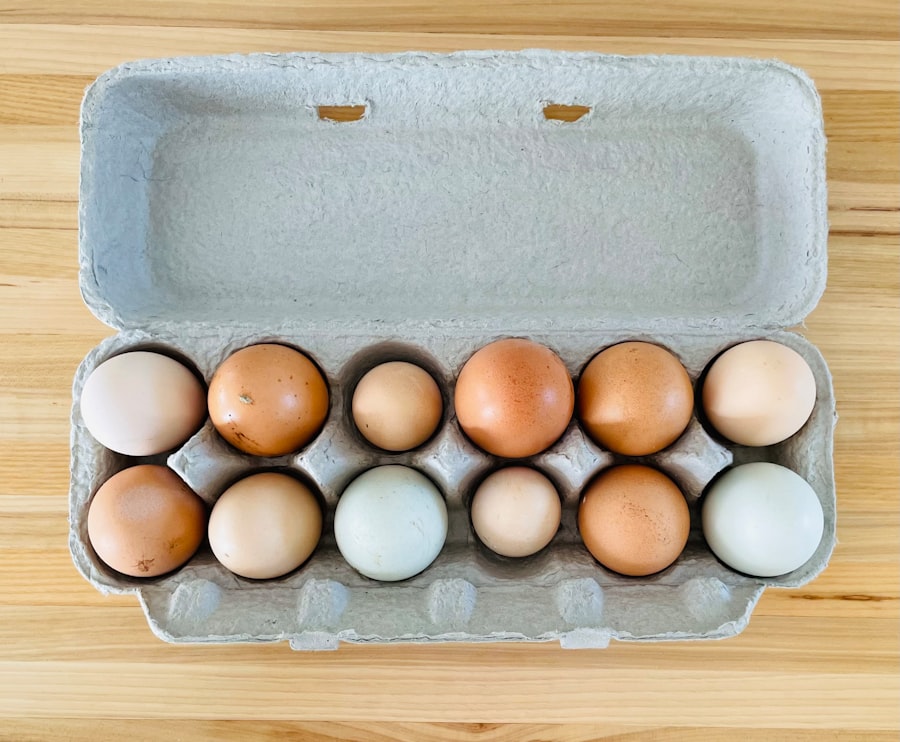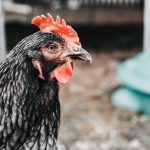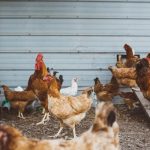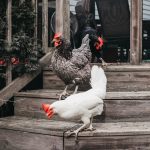When raising chickens, proper housing and space requirements are crucial. Each bird should have 2-3 square feet of space inside the coop and 8-10 square feet in the outdoor run. This allows chickens to move freely, stretch their wings, and engage in natural behaviors like dust bathing and foraging.
Adequate ventilation in the coop is essential for maintaining good air quality and preventing respiratory issues. The coop should be well-constructed and predator-proof to ensure the chickens’ safety. It should include nesting boxes for egg-laying and roosting bars for perching at night.
Regular cleaning and moisture control are necessary to prevent harmful bacteria and parasites. Fresh water and a balanced diet must be provided at all times to maintain the birds’ health and well-being. A secure outdoor run is important for chickens to access fresh air, sunlight, and exercise opportunities.
The run should be enclosed with wire mesh to protect against predators and include shelter from the elements. Ample outdoor space promotes physical health and allows chickens to exhibit natural behaviors such as scratching and pecking. Providing adequate housing and space for chickens is essential for their overall well-being and productivity.
These conditions contribute to healthier, happier birds and better egg production.
Table of Contents
- 1 Feeding and Nutrition
- 2 Health and Disease Management
- 3 Egg Collection and Handling
- 4 Waste Management
- 5 Predator Protection
- 6 Record Keeping and Monitoring
- 7 FAQs
- 7.1 What are the basic requirements for keeping 200 layer chickens?
- 7.2 What type of housing is suitable for 200 layer chickens?
- 7.3 What kind of feeding and watering systems are required for 200 layer chickens?
- 7.4 How often should the health of 200 layer chickens be monitored?
- 7.5 What are the key factors to consider for the successful management of 200 layer chickens?
Key Takeaways
- Provide at least 2-3 square feet of space per chicken in the coop and 8-10 square feet in the run
- Ensure proper ventilation and insulation in the coop to regulate temperature and prevent respiratory issues
- Use nesting boxes filled with clean bedding for egg laying and provide roosting bars for perching at night
- Provide access to fresh water and a balanced diet of commercial feed, grains, and kitchen scraps
- Monitor for signs of illness and disease, and consult a veterinarian if necessary
Feeding and Nutrition
Commercial Feed and Supplements
A good quality commercial feed that is specifically formulated for laying hens is a convenient option for providing the necessary nutrients. It is important to ensure that the feed is fresh and free from mold or contaminants. In addition to commercial feed, chickens can also benefit from supplemental treats such as fruits, vegetables, and grains.
Treats and Enrichment
These treats can provide additional nutrients and variety in their diet, as well as serve as enrichment for the birds. However, it is important to offer treats in moderation and avoid feeding them foods that are harmful to chickens, such as avocado or chocolate.
Access to Fresh Water
Access to fresh, clean water is also essential for chickens’ health and egg production. Chickens require a constant supply of water throughout the day, especially during hot weather or when they are laying eggs. It is important to regularly clean and refill water containers to prevent contamination and ensure that the birds have access to clean water at all times. Overall, providing a balanced diet that meets the nutritional needs of the chickens is essential for their overall health, egg production, and quality of eggs. It is important to monitor their feed intake and make adjustments as needed based on their age, breed, and production levels.
Health and Disease Management

Maintaining the health of your flock is essential for successful chicken farming. Regular health checks are important to monitor the overall well-being of the birds and identify any potential issues early on. It is important to observe the chickens daily for any signs of illness or injury, such as changes in behavior, decreased appetite, or abnormal droppings.
Additionally, regular veterinary check-ups can help ensure that any health issues are addressed promptly. Preventative measures such as vaccination and parasite control are important aspects of disease management in chickens. Vaccinations can help protect the birds from common diseases such as Marek’s disease or Newcastle disease.
Additionally, regular deworming and parasite control can help prevent infestations that can negatively impact the health and productivity of the flock. Maintaining a clean and hygienic environment is also crucial for preventing disease outbreaks. Regularly cleaning the coop, removing soiled bedding, and disinfecting feeders and waterers can help reduce the risk of bacterial or viral infections.
It is also important to practice good biosecurity measures to prevent the introduction of diseases into the flock. In the event of illness or injury, it is important to isolate affected birds from the rest of the flock to prevent the spread of disease. Providing appropriate care and treatment for sick or injured birds can help them recover more quickly and prevent further complications.
Overall, proactive health management practices such as regular monitoring, preventative measures, and prompt treatment of any health issues are essential for maintaining a healthy flock of chickens.
Egg Collection and Handling
Proper egg collection and handling are important aspects of managing a successful egg-laying operation. It is important to collect eggs frequently to prevent them from being damaged or soiled by other birds or environmental factors. Ideally, eggs should be collected at least once or twice a day to ensure that they are clean and in good condition.
When collecting eggs, it is important to handle them carefully to prevent cracking or breakage. Using clean hands or gloves when handling eggs can help prevent contamination from bacteria or dirt. It is also important to avoid washing eggs unless absolutely necessary, as washing can remove the protective bloom on the eggshell that helps prevent bacteria from entering the egg.
After collecting eggs, it is important to store them properly to maintain their freshness and quality. Eggs should be stored in a cool, dry place with consistent temperature and humidity levels. It is best to store eggs with the pointed end down to help maintain their freshness.
Proper labeling of eggs with the date of collection can help ensure that older eggs are used first, which can help maintain egg quality. Additionally, regular rotation of stored eggs can help prevent spoilage and maintain their freshness. Overall, proper egg collection and handling practices are essential for maintaining egg quality and ensuring food safety for consumers.
Waste Management
Effective waste management is an important aspect of maintaining a clean and healthy environment for your flock of chickens. Proper waste management practices can help reduce odors, prevent the spread of disease, and minimize environmental impact. One key aspect of waste management in chicken farming is managing manure.
Chicken manure can be a valuable source of nutrients for soil when used as fertilizer. However, it is important to manage manure properly to prevent environmental pollution and minimize odors. Regularly cleaning the coop and removing soiled bedding can help reduce the buildup of manure and prevent ammonia levels from becoming too high.
Composting chicken manure can be an effective way to manage waste while also producing a valuable soil amendment for gardening or farming. Composting can help break down organic matter in the manure while reducing odors and pathogens. Properly composted chicken manure can be used as a nutrient-rich fertilizer that can improve soil health and fertility.
In addition to managing manure, it is important to properly dispose of other waste materials such as feed bags or packaging materials. Recycling or properly disposing of waste materials can help reduce environmental impact and maintain a clean and organized farm environment. Overall, effective waste management practices such as proper manure management and waste disposal are essential for maintaining a clean and healthy environment for your flock of chickens.
Predator Protection

Securing the Coop and Outdoor Run
One key aspect of predator protection is securing the coop and outdoor run with sturdy fencing or wire mesh. The fencing should be buried underground to prevent predators from digging underneath it, and it should also be tall enough to prevent predators from climbing over it. Additionally, covering the top of the outdoor run with wire mesh or netting can help prevent aerial predators from gaining access.
Deterrent Devices and Guard Animals
Installing motion-activated lights or sound devices near the coop can help deter nocturnal predators such as raccoons or foxes. These devices can startle predators when they approach the coop, making them less likely to attempt an attack. Using guard animals such as dogs or geese can also help deter predators from approaching the flock. These animals can alert you to potential threats and help protect the chickens from predators.
Regular Inspections and Maintenance
Regularly inspecting the coop and outdoor run for signs of damage or potential entry points for predators can help identify areas that need reinforcement or repair. Overall, implementing effective predator protection measures such as secure fencing, deterrent devices, guard animals, and regular inspections are essential for keeping your flock safe from potential threats.
Record Keeping and Monitoring
Keeping accurate records and monitoring key metrics are important aspects of managing a successful chicken farming operation. Keeping detailed records can help you track important information such as feed consumption, egg production, health issues, or expenses. This information can help you make informed decisions about managing your flock more effectively.
One key aspect of record-keeping is tracking egg production on a daily basis. Keeping records of daily egg production can help you identify patterns or trends in egg laying behavior, which can be useful for managing feed rations or identifying potential health issues. Monitoring feed consumption on a regular basis can help you track how much feed your flock is consuming over time.
This information can help you adjust feed rations based on production levels or identify potential issues such as decreased appetite. Keeping records of health issues or treatments administered can help you track the overall health status of your flock over time. This information can be useful for identifying recurring health issues or evaluating the effectiveness of treatments.
Tracking expenses such as feed costs, veterinary expenses, or equipment purchases can help you manage your budget more effectively and identify areas where you may be able to reduce costs. Overall, keeping accurate records and monitoring key metrics such as egg production, feed consumption, health issues, and expenses are essential for managing a successful chicken farming operation. This information can help you make informed decisions about managing your flock more effectively while maximizing productivity and profitability.
If you’re considering keeping 200 layer chickens, you may want to explore different coop options to accommodate your flock. One article on Poultry Wizard discusses turning a shed into a chicken coop, which could be a practical solution for housing a large number of chickens. You can read more about it here.
FAQs
What are the basic requirements for keeping 200 layer chickens?
To keep 200 layer chickens, you will need a suitable housing facility, proper feeding and watering systems, adequate ventilation, and regular health monitoring. It is also important to provide nesting boxes for the hens to lay their eggs.
What type of housing is suitable for 200 layer chickens?
A suitable housing facility for 200 layer chickens should provide enough space for the birds to move around comfortably and should be well-ventilated. The housing should also protect the chickens from predators and extreme weather conditions.
What kind of feeding and watering systems are required for 200 layer chickens?
Feeding and watering systems for 200 layer chickens should be designed to provide easy access to feed and water for all the birds. This may include automatic feeders and waterers to ensure a constant supply of food and water.
How often should the health of 200 layer chickens be monitored?
The health of 200 layer chickens should be monitored regularly to check for signs of illness or disease. This may include regular inspections of the birds, as well as consulting with a veterinarian for any health concerns.
What are the key factors to consider for the successful management of 200 layer chickens?
Successful management of 200 layer chickens requires attention to factors such as proper nutrition, disease prevention, and maintaining a clean and comfortable living environment for the birds. It is also important to have a good understanding of the behavior and needs of layer chickens.
Meet Walter, the feathered-friend fanatic of Florida! Nestled in the sunshine state, Walter struts through life with his feathered companions, clucking his way to happiness. With a coop that’s fancier than a five-star hotel, he’s the Don Juan of the chicken world. When he’s not teaching his hens to do the cha-cha, you’ll find him in a heated debate with his prized rooster, Sir Clucks-a-Lot. Walter’s poultry passion is no yolk; he’s the sunny-side-up guy you never knew you needed in your flock of friends!







